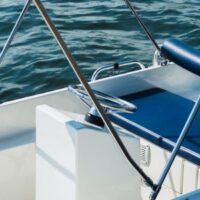Passenger Safety and Legal Rights Aboard Charter Boats in Florida

Florida’s coastline makes it one of the nation’s top destinations for charter boat excursions, from deep-sea fishing trips and sightseeing tours to luxury yacht outings. But when accidents happen on the water, passengers may not realize they have specific legal rights.
Understanding passenger safety standards and the remedies available under maritime and state law is essential if you or a loved one are injured aboard a chartered vessel.
Common Safety Risks on Florida Charter Boats
Even well-run charter companies face risks. A sudden storm or mechanical problem can quickly escalate into danger. Most times, passenger injuries stem from entirely preventable issues. Slip-and-fall accidents are common on wet decks that lack anti-slip mats or proper handrails. Mechanical failures such as engine breakdowns, steering problems, or electrical malfunctions often occur when vessels are poorly maintained. Some boats leave shore without adequate safety equipment, including life vests, fire extinguishers, or functioning radios.
Negligent operation also contributes to accidents, particularly when captains speed, attempt reckless maneuvers, or operate vessels under the influence of alcohol. In other cases, companies may overload vessels with more passengers than permitted, increasing the risk of capsizing and reducing the availability of life-saving equipment. The Coast Guard requires commercial passenger vessels to meet specific safety standards, and when operators cut corners, the result can be devastating injuries for passengers.
Legal Duties of Charter Boat Operators
Charter operators must comply with both state and federal maritime law. Their obligations include maintaining seaworthiness by ensuring vessels are reasonably fit for their intended use. They are required to provide proper safety equipment, such as life jackets, fire safety tools, and emergency beacons. They must also hire qualified captains and crew; captains are required to hold U.S. Coast Guard licenses, and crews must be trained in emergency response.
In addition, charter operators must warn passengers of known risks, such as slippery surfaces or approaching rough weather. Failing to meet these standards can expose owners and operators to liability when passengers are hurt. Many passenger injuries also occur at the time of embarkation or disembarkation due to crew error or because the charter company has no provided a safe means of getting on and off of the vessel. At www.888BoatLaw.com this is one of the two most frequent injury-causing problems we see. The other most prolific failure which causes the most injuries on charter vessels is operator error of the vessel while under way.
Passenger Rights After an Injury
If you are injured aboard a charter boat in Florida, several potential legal remedies may apply. Negligence claims are one option, allowing you to pursue damages if your injuries were caused by unsafe practices or crew mistakes. Federal maritime law remedies almost always apply when incidents occur in navigable waters, as maritime law imposes duties that go beyond state negligence law. This is why it is critical that you retain knowledgeable maritime counsel, not auto accident counsel, to handle your charter-boat accident.
Product liability claims may arise if defective equipment, such as malfunctioning engines or faulty life jackets, contributes to an accident. Depending on the case, damages may include medical costs, lost wages, pain and suffering, or wrongful death claims filed by surviving family members.
Case Studies Illustrating Passenger Remedies
Slip-and-fall injuries are among the most common claims. In one case, a passenger slipped on a wet deck coated with fish remains and fractured a wrist. The crew had failed to provide non-slip mats or warning signs. The court found the charter operator negligent and awarded damages for medical costs and lost income.
Another example involved carbon monoxide poisoning aboard a yacht. Passengers became ill when the vessel’s exhaust system malfunctioned. Investigators determined the yacht had not been properly maintained, and the court held the operator liable for failing to keep the vessel seaworthy.
In yet another case, a sightseeing boat capsized after carrying more passengers than permitted. Survivors filed negligence and statutory violation claims, and the operator was held accountable for exceeding Coast Guard safety limits. These cases show that courts consistently hold operators responsible when they fail to provide safe conditions, but you need qualified maritime counsel to represent you in these claims. This is not the time to contact an automobile crash attorney.
Florida Law and Maritime Jurisdiction
Boating accidents in Florida often fall under both state and federal jurisdiction. State courts may handle personal injury claims under Florida negligence law, while federal courts may apply maritime law to accidents on navigable waters. The distinction matters: maritime law imposes specific duties on vessel owners and often limits their ability to escape liability.
Contact Frank D. Butler, PA.
If you have been injured while aboard a charter sightseeing or charter fishing boat in Florida, you have the right to pursue compensation under negligence, maritime law, or even product liability, depending on the circumstances of your accident. Charter operators are legally responsible for providing seaworthy vessels, trained crew, and safe conditions, and when they fail to live up to their lawful obligations, passengers often are seriously injured.
Documenting what happened and speaking with an experienced maritime attorney as soon as possible can make all the difference in your case. Frank D. Butler, PA., the attorneys at www.888BoatLaw.com have decades of experience holding charter operators accountable and securing justice for injured passengers in Florida. Contact us today for a free consultation and let us fight for the recovery you deserve. There are time limits on pursuing cases like these that involve maritime law. These statutes of limitations are different than those for an auto accident. If you have been injured on a charter boat or on any type of boat in Florida you should pursue your claim immediately and without delay or your case can be lost.
Sources:
S. Coast Guard – Boating Safety Regulations
Florida Fish and Wildlife Conservation Commission – Boating Safety
